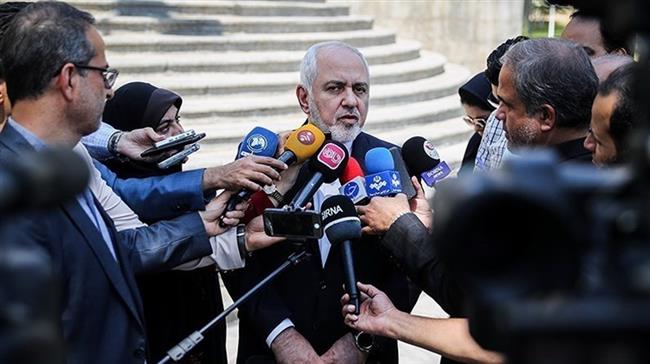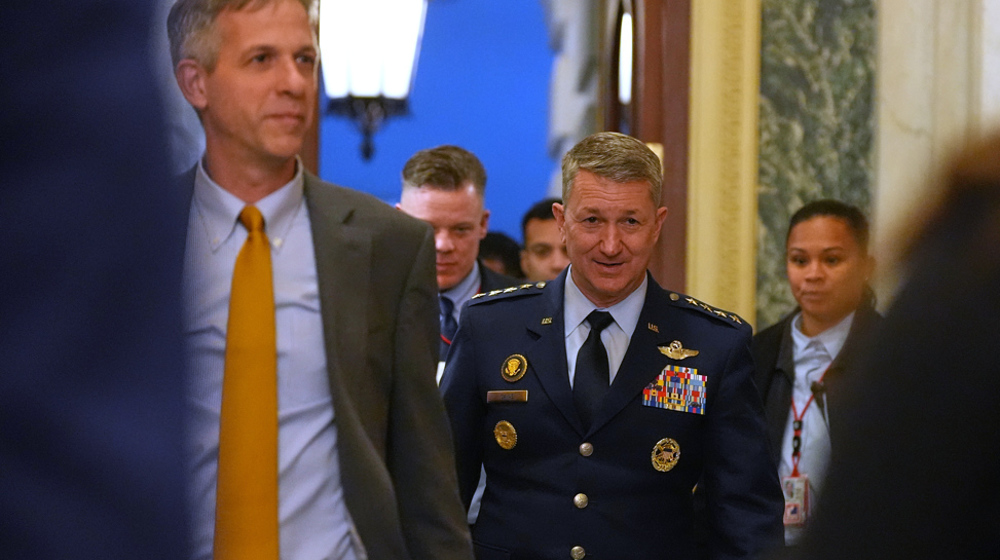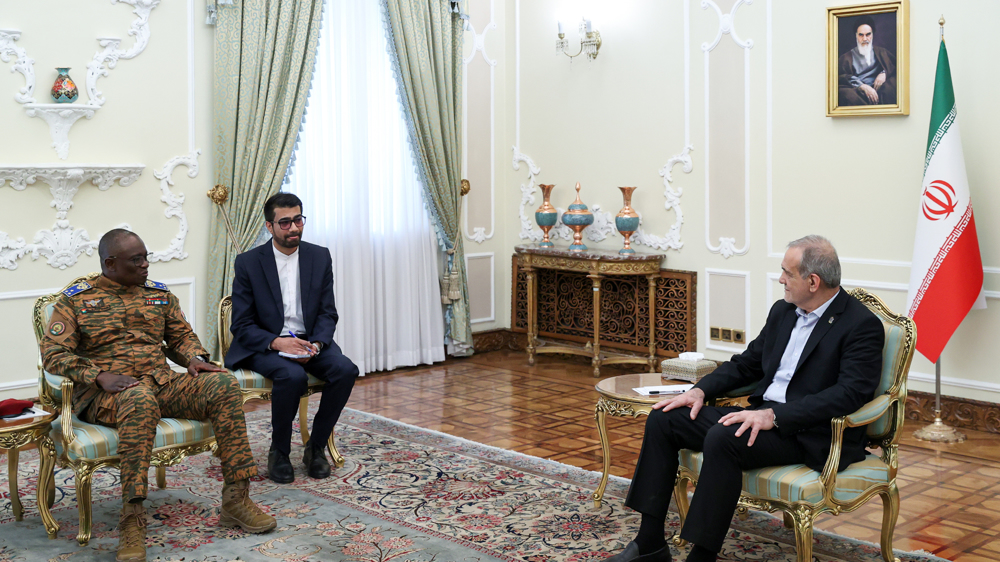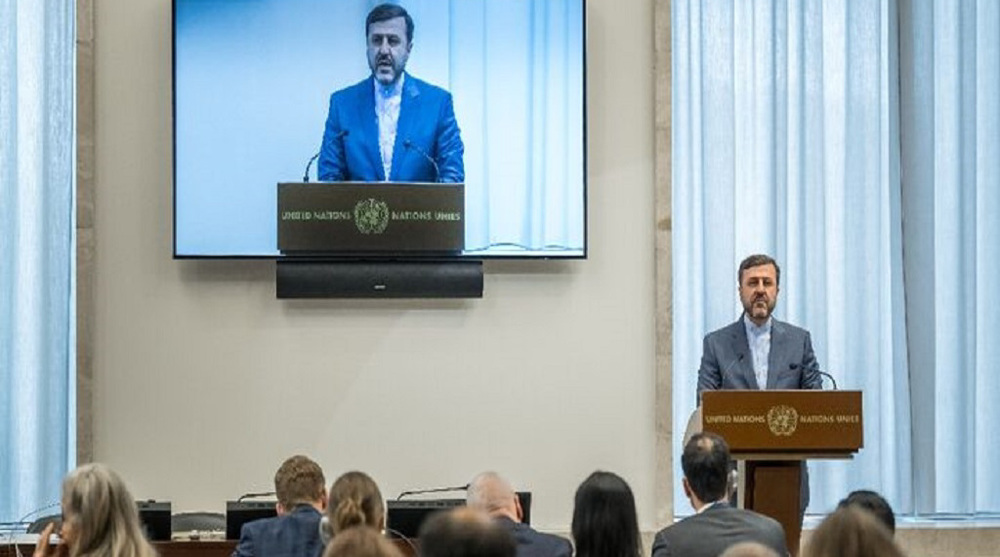FM Zarif: High voter turnout big contributor to Iran’s diplomacy against US
Iranian Foreign Minister Mohammad Javad Zarif has called for a high turnout in Friday’s parliamentary elections, saying massive participation will strengthen the country’s diplomacy to counter US policies.
“If we want to strengthen the hand of my team in foreign policy [arena] so that they can more seriously counter the sanctions… we have to compel the US to come back to the negotiating table, not bilateral talks but the negotiations that the US has left and that is the P5+1 talks,” Zarif told reporters on Wednesday on the sidelines of a cabinet session.
“As the Leader said for the US to wake up to its defeat and come back to the negotiating table, lift sanctions and make up for the losses incurred on the Iranian nation, it needs to know and see that the sanctions have been ineffective and people participate in the elections fervently. This is the biggest boost to the Islamic Republic’s diplomacy to counter the US’ policies,” he added.
Zarif said it is time that the US understood its “maximum pressure policy” had failed.
The top Iranian diplomat said the Iranians showed through their massive participation for the funeral processions of Lieutenant General Qassem Soleimani, the commander of the Quds Force of the Islamic Revolution Guards Corps, that they do not accept the US’ policies and would defend their country against Washington.
“The best manifestation for this support is participation in the election,” he added.
Iran is to hold the parliamentary elections on February 21 for the 11th Majlis (Parliament) since the 1979 Islamic Revolution.
More than 7,000 candidates are to vie in the polls for 290 seats, five of them representing religious minorities.
Earlier on Wednesday, Iran's President Hassan Rouhani also said an inclusive and enthusiastic popular turnout in this Friday's parliamentary elections will enrage the United States, stressing the significant role of the legislative chamber in moving forward government efforts to thwart Washington’s sanctions.
Iran can triumph over the US pressure campaign through perseverance and strength, Rouhani told the Wednesday cabinet session.
Also on Tuesday, Leader of the Islamic Revolution Ayatollah Seyyed Ali Khamenei said the upcoming parliamentary elections in Iran are taking place at a critical time of US pressure and attempts to drive a wedge between the Iranian nation and government, calling for a large turnout in the polls to foil Washington's “evil intentions.”
The Leader called elections a contributor to the strength of the country and said the US formed think tanks of dozens or hundreds of people to plan to alienate the Iranian people and the youth in particular from the government.
Europeans proved submissive to US
Also in his remarks, Zarif commented on the foreign countries leaving Iran due to the US sanctions and criticized the Europeans for submitting to US pressures.
“The Europeans did not support the US sanctions but yielded to them and proved they are submissive to pressures,” the Iranian foreign minister said.
He added that the Europeans’ failure to stand up to the US bullying was of no avail as Washington again threatened to place more duties on European automobile imports and approved sanctions on firms that help finish a gas pipeline into the European Union.
In May 2018, Washington in a unilateral move left the 2015 nuclear deal between Iran and the P5+1 group of countries -- the US, UK, France, Russia, China and Germany -- and reimposed the sanctions that had been lifted under the agreement.
Europe later set up a special trading mechanism called INSTEX to protect trade with Iran after Washington’s withdrawal.
However, despite repeated promises by the EU to make the mechanism operational, it has yet to complete any transactions.
One year after the US pullout and the Europeans’ failure to maintain business with Tehran in the face of the US sanctions, Iran started taking steps in scaling back its obligations under the JCPOA, known as the Joint Comprehensive Plan of Action (JCPOA).
Iran, however, says it will reverse the measures once the Europeans take “concrete” measures and provide “meaningful” economic benefits to the country.
Trump's top general warns of Iran aggression risks: reports
VIDEO | US ambassador’s remarks on Israel’s expansion spark outrage
VIDEO | ‘Protect the Right to Protest’ rally held outside London court
VIDEO | Gaza bakery supports displaced families ahead of Ramadan Iftar
France blocks US ambassador from ministerial meetings after summons no-show
Around 20 nations condemn Israeli push toward West Bank annexation
Iran pursuing broader cooperation with African nations: Pezeshkian
Israeli minister threatens to seize entire Gaza if Hamas refuses to disarm












 This makes it easy to access the Press TV website
This makes it easy to access the Press TV website